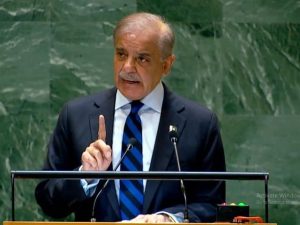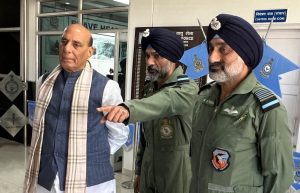New Delhi – Shehbaz Sharif has called for dialogue between India and Pakistan to resolve outstanding issues, including the Kashmir dispute. This appeal came shortly after India’s Defence Minister Rajnath Singh issued a stern warning to Pakistan, emphasizing that “Operation Sindoor” is not yet over and that Pakistan remains “on probation.”
Rajnath Singh’s Warning to Pakistan Triggers Diplomatic Response
Addressing a gathering on Friday, Sharif acknowledged the futility of past conflicts, stating that both nations “fought three wars and got nothing.” His comments appear to be a direct response to Rajnath Singh’s warning to Pakistan delivered earlier the same day, in which the Indian Defence Minister made it clear that Pakistan’s behavior would determine future Indian actions.

“The lesson is to sit down as peaceful neighbors and settle all outstanding issues, including Jammu and Kashmir. Without resolution of our issues, we cannot have peace in this part of the world,” Sharif remarked during a special ‘Youm-e-Tashakur’ (Day of Thanks) event in Islamabad.
Also Read: Indians Boycott Travel To Turkey: Alarming 250% Surge in Cancellations
Tensions Following Operation Sindoor and Rajnath Singh’s Warning to Pakistan
The current diplomatic exchanges follow a four-day military confrontation that ended with an understanding reached on May 10. The confrontation was marked by intense cross-border drone and missile exchanges, reflecting the heightened tensions between the two nuclear-armed neighbors.
India had launched Operation Sindoor on May 7, conducting precision strikes on terrorist infrastructure in response to the April 22 Pahalgam terror attack that claimed 26 lives. Rajnath Singh’s warning to Pakistan came in the aftermath of these operations, signaling India’s resolve to continue its counter-terrorism efforts.
Details of Rajnath Singh’s Warning to Pakistan
Rajnath Singh’s statements were unambiguous in their message to Pakistan. “When the right time comes, we will show the full picture to the world. We have kept Pakistan on probation. If its behavior improves, then okay, otherwise, it will be given the strictest punishment,” the Defence Minister declared.
This explicit warning from Rajnath Singh to Pakistan underscores India’s changed stance on cross-border terrorism, indicating that New Delhi is prepared to take further action if necessary. The message conveyed through Rajnath Singh’s warning to Pakistan represents a continuation of India’s firm policy against terrorism emanating from Pakistani soil.
Pakistan’s Response to Rajnath Singh’s Warning


In his address, Sharif attempted to balance his call for peace with an assertion of Pakistan’s military readiness. Despite Rajnath Singh’s warning to Pakistan, Sharif maintained that while “Pakistan is a peaceful country, it reserves the right to give a befitting response in its defense.”
The Pakistani Prime Minister praised his country’s armed forces for what he described as responding “befittingly and effectively” during the recent confrontation with India. He claimed they had written a “golden chapter” in Pakistan’s military history, a statement that appears to be aimed at domestic audiences following Rajnath Singh’s warning to Pakistan.
The Context of Rajnath Singh’s Warning to Pakistan
Rajnath Singh’s warning to Pakistan comes against the backdrop of long-standing tensions between the two countries, particularly regarding terrorism. India has consistently maintained that Pakistan harbors terrorist groups that carry out attacks on Indian soil, a claim Pakistan denies.
The April 22 Pahalgam attack, which prompted India’s Operation Sindoor, represents the latest in a series of terrorist incidents that India attributes to Pakistan-based groups. Rajnath Singh’s warning to Pakistan reflects India’s growing impatience with what it perceives as Pakistan’s failure to address these concerns.
India’s Conditions for Dialogue Despite Rajnath Singh’s Warning to Pakistan
While Sharif has called for comprehensive dialogue, India has established clear parameters for any potential talks. New Delhi has stated that discussions with Pakistan will only focus on the return of Pakistan-occupied Kashmir and terrorism issues.
This position indicates that despite Rajnath Singh’s warning to Pakistan, India remains open to diplomatic engagement—but on its own terms. The emphasis on terrorism in any future dialogue directly connects to Rajnath Singh’s warning to Pakistan about consequences for continued support of terrorist activities.
Regional Implications of Rajnath Singh’s Warning to Pakistan
The exchange between Sharif and Singh has significant implications for regional stability. Following Rajnath Singh’s warning to Pakistan, observers are closely monitoring how this diplomatic posturing might affect the fragile peace in South Asia.
The ceasefire agreement reached on May 10 has temporarily halted military confrontation, but Rajnath Singh’s warning to Pakistan suggests that India remains vigilant and prepared to respond to any provocations. This stance could either deter future terrorist activities or potentially escalate tensions, depending on Pakistan’s response to Rajnath Singh’s warning.
International Reactions to Operation Sindoor and Rajnath Singh’s Warning to Pakistan
Various international actors have commented on the recent India-Pakistan tensions. Notably, Russia has expressed its reaction to India’s Operation Sindoor against Pakistan-based terror groups, though the specific nature of Moscow’s response was not detailed in reports.
The international community is likely watching closely following Rajnath Singh’s warning to Pakistan, as any significant conflict between the two nuclear powers would have global implications. The diplomatic positioning of major powers could influence how both India and Pakistan proceed following Rajnath Singh’s warning.
Domestic Politics and Rajnath Singh’s Warning to Pakistan
Within both countries, the recent tensions and subsequent diplomatic exchanges have political dimensions. Rajnath Singh’s warning to Pakistan may resonate with domestic constituents in India who support a strong stance against terrorism.
Similarly, Sharif’s balancing act—calling for peace while asserting Pakistan’s right to self-defense—appears calibrated for domestic consumption. The ‘Youm-e-Tashakur’ events held across Pakistan, celebrating the armed forces’ response to Indian actions, suggest efforts to build national unity following Rajnath Singh’s warning to Pakistan.
The Path Forward After Rajnath Singh’s Warning to Pakistan


The immediate future of India-Pakistan relations remains uncertain. Rajnath Singh’s warning to Pakistan has established clear expectations for Pakistani behavior, while Sharif’s overture for dialogue presents a potential diplomatic opening.
Whether these developments lead to meaningful engagement or further confrontation may depend on concrete actions rather than rhetoric. Particularly significant will be Pakistan’s approach to terrorist groups operating from its territory—a key concern underlying Rajnath Singh’s warning to Pakistan.
Final Word: Balancing Dialogue and Deterrence After Rajnath Singh’s Warning to Pakistan


The exchange between Sharif and Singh represents the complex dynamics of India-Pakistan relations. Rajnath Singh’s warning to Pakistan demonstrates India’s commitment to defending its security interests, while Sharif’s call for dialogue reflects an understanding that diplomatic engagement is ultimately necessary for regional stability.
As both nations navigate the aftermath of recent tensions, the effectiveness of Rajnath Singh’s warning will be measured by changes in Pakistan’s actions regarding terrorism. Similarly, the sincerity of Sharif’s peace overture will be judged by Pakistan’s willingness to address India’s core concerns about cross-border terrorism.
The coming weeks may reveal whether Rajnath Singh’s warning to Pakistan will lead to meaningful changes in the relationship between these two nuclear neighbors, or whether it marks merely another chapter in their long-standing conflict.

